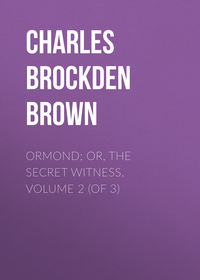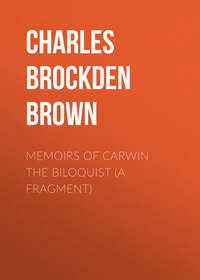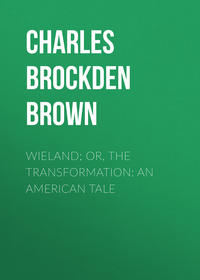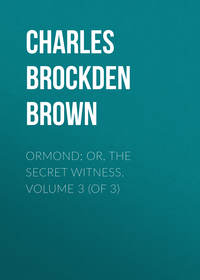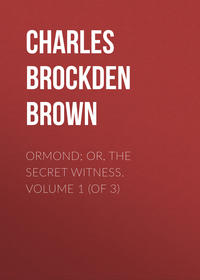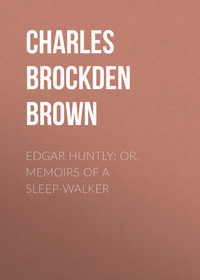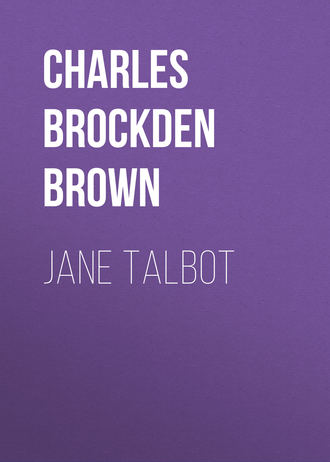 полная версия
полная версияJane Talbot
I am now shut up in my chamber at an inn. I feel as if in a wilderness of savages, where all my safety consisted in solitude. I was glad not to meet with a human being whom I knew.
What I shall say to Miss Jessup when I see her, I know not. I have reason to believe her the author of many slanders, but look for no relief from the mischiefs they have occasioned, in accusing or upbraiding the slanderer. She has likewise disclosed many instances of guilty conduct, which I supposed impossible to be discovered. I never concealed them from Mrs. Talbot, to whom a thorough knowledge of my character was indispensable; but I was unwilling to make any other my confessor. In this I cannot suppose her motives to have been very benevolent; but, since she adhered to the truth, it is not for me to arraign her motives.
May I not suspect that she had some hand in the forgery lately come to light? A mind like hers must hate a successful rival. To persuade Talbot of his wife's perfidy was at least to dissolve his alliance with another; and since she took so much pains to gain his favour, even after his marriage, is it not allowable to question the delicacy and punctiliousness, at least, of her virtue?
Mrs. Fielder's aversion to me is chiefly founded on a knowledge of my past errors. She thinks them too flagrant to be atoned for, and too inveterate to be cured. I can never hope to subdue perfectly that aversion, and, though Jane can never be happy without me, I alone cannot make her happy. On my own account, therefore, it is of little moment what she believes. But her own happiness is deeply concerned in clearing her daughter's character of this blackest of all stains.
Here is some one coming up the stairs towards my apartment. Surely it cannot be to me that this visit is intended.
Good Heaven! What shall I do?
It was Molly that has just left me.
My heart sunk at her appearance. I had made up my mind to separate my evil destiny from that of Jane, and could only portend new trials and difficulties from the appearance of one whom I supposed her messenger.
The poor girl, as soon as she saw me, began to sob bitterly, and could only exclaim, "Oh, sir! Oh, Mr. Colden!"
This behaviour was enough to terrify me. I trembled in every joint while I faltered out, "I hope your mistress is well?"
After many efforts, I prevailed in gaining a distinct account of my friend's situation. This good girl, by the sympathy she always expressed in her mistress's fortunes, by her silent assiduities and constant proofs of discretion and affection, had gained Mrs. Talbot's confidence; yet no further than to indulge her feelings with less restraint in Molly's presence than in that of any other person.
I learned that the night after Mrs. Fielder's arrival was spent by my friend in sighs and restlessness. Molly lay in the same chamber, and her affectionate heart was as much a stranger to repose as that of her mistress. She frequently endeavoured to comfort Mrs. Talbot, but in vain.
Next day she did not rise as early as usual. Her mother came to her bedside, and inquired affectionately after her health. The visit was received with smiling and affectionate complacency. Her indisposition was disguised, and she studied to persuade Mrs. Fielder that she enjoyed her usual tranquillity. She rose, and attempted to eat, but quickly desisted, and after a little while retired and locked herself up in her chamber. Even Molly was not allowed to follow her.
In this way that and the ensuing day passed. She wore an air of constrained cheerfulness in her mother's presence; affected interest in common topics; and retired at every convenient interval to her chamber, where she wept incessantly.
Mrs. Fielder's eye was watchful and anxious. She addressed Mrs. Talbot in a tender and maternal accent; seemed solicitous to divert her attention by anecdotes of New York friends; and carefully eluded every subject likely to recall images which were already too intimately present. The daughter seemed grateful for these solicitudes, and appeared to fight with her feelings the more resolutely because they gave pain to her mother.
All this was I compelled to hear from the communicative Molly.
My heart bled at this recital. Too well did I predict what effect her compliance would have on her peace.
I asked if Jane had not received a letter from me.
Yes; two letters had come to the door at once, this morning,–one for Mrs. Fielder and the other for her daughter. Jane expected its arrival, and showed the utmost impatience when the hour approached. She walked about her chamber, listened, with a start, to every sound, continually glanced from her window at the passengers.
She did not conceal from Molly the object of her solicitude. The good girl endeavoured to soothe her, but she checked her with vehemence:–"Talk not to me, Molly. On this hour depends my happiness,–my life. The sacrifice my mother asks is too much or too little. In bereaving me of my love, she must be content to take my existence also. They never shall be separated."
The weeping girl timorously suggested that she had already given me up.
"True, Molly, in a rash moment I told him that we meet no more; but two days of misery have convinced me that it cannot be. His answer will decide my fate as to this world. If he accept my dismissal, I am thenceforth undone. I will die. Blessing my mother, and wishing her a less stubborn child, I will die."
These last words were uttered with an air the most desperate, and an emphasis the most solemn. They chilled me to the heart, and I was unable longer to keep my seat. Molly, unbidden, went on.
"Your letter at last came. I ran down to receive it. Mrs. Fielder was at the street-door before me, but she suffered me to carry my mistress's letter to her. Poor lady! She met me at the stair-head, snatched the paper eagerly, but trembled so she could not open it. At last she threw herself on the bed, and ordered me to read it to her. I did so. At every sentence she poured forth fresh tears, and exclaimed, wringing her hands, 'Oh, what–what a heart have I madly cast away!'"
The girl told me much more, which I am unable to repeat. Her visit was self-prompted. She had caught a glimpse of me as I passed the door, and, without mentioning her purpose to her mistress, set out as soon as it was dusk.
"Cannot you do something, Mr. Colden, for my mistress?" continued the girl. "She will surely die if she has not her own way; and, to judge from your appearance, it is as great a cross to you as to her."
Heaven knows, that, with me, it is nothing but the choice of dreadful evils. Jane is the mistress of her own destiny. It is not I that have renounced her, but she that has banished me. She has only to recall the sentence, which she confesses to have been hastily and thoughtlessly pronounced, and no power on earth shall sever me from her side.
Molly asked my permission to inform her mistress of my being in the city, and conjured me not to leave it, during the next day at least. I readily consented, and requested her to bring me word in the morning in what state things were.
She offered to conduct me to her then. It was easy to effect an interview without Mrs. Fielder's knowledge; but I was sick of all clandestine proceedings, and had promised Mrs. Fielder not to seek another meeting with her daughter. I was likewise anxious to visit Miss Jessup, and ascertain what was to be done by means of the letter in my pocket.
Can I, my friend,–can I, without unappeasable remorse, pursue this scheme of a distant voyage? Suppose some fatal despair should seize my friend. Suppose–it is impossible. I will not stir till she has had time to deliberate; till resignation to her mother's will shall prove a task that is practicable.
Should I not be the most fragrant of villains if I deserted one that loved me? My own happiness is not a question. I cannot be a selfish being and a true lover. Happiness, without her, is indeed a chimerical thought; but my exile would be far from miserable, while assured of her tranquillity, and possession would confer no peace, if she whom I possessed were not happier than a different destiny would make her.
Why have all these thoughts been suspended for the last two days? I had wrought myself up to a firm persuasion that marriage was the only remedy for all evils; that our efforts to regain the favour of her mother would be most likely to succeed when that which she endeavoured to prevent was irretrievable. Yet that persuasion was dissipated by her last letter. That convinced me that her lot would only be made miserable by being united to mine. Yet now, is it not evident that our fates must be inseparable?
What a fantastic impediment is this aversion of her mother! And yet, can I safely and deliberately call it fantastic? Let me sever myself from myself, and judge impartially. Be my heart called upon to urge its claims to such affluence, such love, such treasures of personal and mental excellence, as Jane has to bestow. Would it not be dumb? It is not so absurd as to plead its devotion to her as an atonement for every past guilt, and as affording security for future uprightness.
On my own merit I am, and ever have been, mute. I have plead with Mrs. Fielder, not for myself, but for Jane. It is her happiness that forms the object of my supreme regard. I am eager to become hers, because her, not because my happiness, though my happiness certainly does, demand it.
I am then resolved. Jane's decision shall be deliberate. I will not bias her by prayers or blandishments. Her resolution shall spring from her own judgment, and shall absolutely govern me. I will rivet myself to her side, or vanish forever, according to her pleasure.
I wish I had written a few words to her by Molly, assuring her of my devotion to her will. And yet, stands she in need of any new assurances? She has banished me. I am preparing to fly. She recalls me, and it is impossible to depart.
I must go to Miss Jessup's. I will take up the pen ('tis my sole amusement) when I return.
I went to Miss Jessup's; her still sealed letter in my pocket; my mind confused, perplexed, sorrowful; wholly undetermined as to the manner of addressing her, or the use to be made of this important paper. I designedly prolonged my walk, in hopes of forming some distinct conception of the purpose for which I was going, but only found myself each moment sinking into new perplexities. Once I had taken the resolution of opening her letter, and turned my steps towards the fields, that I might examine it at leisure; but there was something disgraceful in the violation of a seal, which scared me away from this scheme.
At length, reproaching myself for this indecision, and leaving my conduct to be determined by circumstances, I went directly to her house.
Miss Jessup was unwell; was unfit to see company; desired me to send up my name. I did not mention my name to the servant, but replied I had urgent business, which a few minutes' conversation would despatch. I was admitted.
I found the lady in a careless garb, reclining on a sofa, wan, pale, and of a sickly aspect On recognising me, she assumed a languidly-smiling air, and received me with much civility. I took my seat near her. She began to talk:–
"I am very unwell; got a terrible cold, coming from Dover; been laid up ever since; a teasing cough, no appetite, and worse spirits than I ever suffered. Glad you've come to relieve my solitude; not a single soul to see me; Mrs. Talbot never favours a body with a visit. Pray, how's the dear girl? Hear her mother's come; heard, it seems, of your intimacy with Miss Secker; determined to revenge your treason to her goddess; vows she shall henceforth have no more to say to you."
While waiting for admission, I formed hastily the resolution in what manner to conduct this interview. My deportment was so solemn, that the chatterer, glancing at my face in the course of her introductory harangue, felt herself suddenly chilled and restrained:–
"Why, what now, Colden? You are mighty grave, methinks. Do you repent already of your new attachment? Has the atmosphere of Philadelphia reinstated Jane in all her original rights?"
"Proceed, madam. When you are tired of raillery, I shall beg your attention to a subject in which your honour is deeply concerned; to a subject which allows not of a jest."
"Nay," said she, in some little trepidation, "if you have any thing to communicate, I am already prepared to receive it."
"Indeed, Miss Jessup, I have something to communicate. A man of more refinement and address than I can pretend to would make this communication in a more circuitous and artful manner; and a man less deeply interested in the establishment of truth would act with more caution and forbearance. I have no excuse to plead, no forgiveness to ask, for what I am now going to disclose. I demand nothing from you but your patient attention while I lay before you the motives of my present visit.
"You are no stranger to my attachment to Mrs. Talbot. That my passion is requited is likewise known to you. That her mother objects to her union with me, and raises her objections on certain improprieties in my character and conduct, I suppose, has already come to your knowledge.
"You may naturally suppose that I am desirous of gaming her favour; but it is not by the practice of fraud and iniquity, and therefore I have not begun with denying or concealing my faults. Very faulty, very criminal, have I been; to deny that would be adding to the number of my transgressions: but I assure you, Miss Jessup, there have been limits to my follies; there is a boundary beyond which I have never gone. Mrs. Fielder imagines me much more criminal than I really am, and her opinion of me–which, if limited in the strictest manner by my merits, would amply justify her aversion to my marriage with her daughter–is, however, carried further than justice allows.
"Mrs. Fielder has been somewhat deceived with regard to me. She thinks me capable of a guilt of which, vicious as I am, I am yet incapable. Nay, she imagines I have actually committed a crime of which I am wholly innocent.
"What think you, madam," (taking her hand, and eyeing her with steadfastness;) "she thinks me at once so artful and so wicked that I have made the wife unfaithful to the husband; that I have persuaded Mrs. Talbot to forget what was due to herself, her fame, and to trample on her marriage-vow.
"This opinion is not a vague conjecture on suspicion. It is founded in what seems to be the most infallible of all evidence; the written confession of her daughter. The paper appears to be a letter which was addressed to the seducer soon after the guilty interview. This paper came indirectly into Mrs. Fielder's hands. To justify her charge against us, she has shown it to, us. Now, madam, the guilt imputed to us is a stranger to our hearts. The crime which this letter confesses never was committed, and the letter which contains the confession never was written by Jane. It is a forgery.
"Mrs. Fielder's misapprehension, so far as it relates to me, is of very little moment. I can hope for nothing from the removal of this error while so many instances of real misconduct continue to plead against me, but her daughter's happiness is materially affected by it, and for her sake I am anxious to vindicate her fame from this reproach.
"No doubt, Miss Jessup, you have often asked me in your heart, since I began to speak, why I have stated this transaction to you. What interest have you in our concerns? What proofs of affection or esteem have you received from us, that should make you zealous in our behalf? Or what relation has your interest in any respect to our weal or woe? Why should you be called upon as a counsellor or umpire in the little family dissensions of Mrs. Talbot and her mother?
"And do indeed these questions rise in your heart, Miss Jessup? Does not memory enable you to account for conduct which, to the distant and casual observer, to those who know not what you know, would appear strange and absurd?
"Recollect yourself. I will give you a moment to recall the past. Think over all that has occurred since your original acquaintance with Mrs. Talbot or her husband, and tell me, solemnly and truly, whether you discern not the cause of his mistake. Tell me whether you know not the unhappy person whom some delusive prospect of advantage, some fatal passion, has tempted to belie the innocent."
I am no reader of faces, my friend. I drew no inferences from the confusion sufficiently visible in Miss Jessup. She made no attempt to interrupt me, but quickly withdrew her eye from my gaze; hung her head upon her bosom; a hectic flush now and then shot across her check. But these would have been produced by a similar address, delivered with much solemnity and emphasis, in any one, however innocent.
I believe there was no anger in my looks. Supposing her to have been the author of this stratagem, it awakened in me not resentment, but pity. I paused; but she made no answer to my expostulation. At length I resumed, with augmented earnestness, grasping her hand:–
"Tell me, I conjure you, what you know. Be not deterred by any self-regard; but, indeed, how can your interest be affected by clearing up a mistake so fatal to the happiness of one for whom you have always professed a friendly regard?
"Will your own integrity or reputation be brought into question? In order to exculpate your friend, will it be necessary to accuse yourself? Have you been guilty in withholding the discovery? Have you been guilty in contriving the fraud? Did your own hand pen the fatal letter which is now brought in evidence against my friend? Were you yourself guilty of counterfeiting hands, in order to drive the husband into a belief of his wife's perfidy?"
A deadly paleness overspread her countenance at these words. I pitied her distress and confusion, and waited not for an answer which she was unable to give.
"Yes, Miss Jessup, I well know your concern in this transaction. I mean not to distress you; I mean not to put you to unnecessary shame; I have no indignation or enmity against you. I came hither not to injure or disgrace you, but to confer on you a great and real benefit; to enable you to repair the evil which your infatuation has occasioned. I want to relieve your conscience from the sense of having wronged one that never wronged you.
"Do not imagine that in all this I am aiming at my own selfish advantage. This is not the mother's only objection to me, or only proof of that frailty she justly ascribes to me. To prove me innocent of this charge will not reconcile her to her daughter's marriage. It will only remove one insuperable impediment to her reconciliation with her daughter.
"Mrs. Fielder is, at this moment, not many steps from this spot. Permit me to attend you to her. I will introduce the subject. I will tell her that you come to clear her daughter from an unmerited charge, to confess that the unfinished letter was taken by you, and that, by additions in a feigned hand, you succeeded in making that an avowal of abandoned wickedness, which was originally innocent, at least, though perhaps indiscreet."
All this was uttered in a very rapid but solemn accent. I gave her no time to recollect herself; no leisure for denial or evasion. I talked as if her agency was already ascertained; and the feelings she betrayed at this abrupt and unaware attack confirmed my suspicions.
After a long pause, and a struggle, as it were, for utterance, she faltered out, "Mr. Colden, you see I am very sick: this conduct has been very strange. Nothing,–I know nothing of what you have been saying. I wonder at your talking to me in this manner: you might as well address yourself in this style to one you never saw. What grounds can you have for suspecting me of any concern in this transaction?"
"Ah, madam," replied I, "I see you have not strength of mind to confess a fault. Why will you compel me to produce the proof that you have taken an unauthorized part in Mrs. Talbot's concerns? Do you imagine that the love you bore her husband, even after his marriage, the efforts you used to gain his favour, his contemptuous rejection of your advances,–can you imagine that these things are not known?
"Why you should endeavour to defraud the wife of her husband's esteem, is a question which your own heart only can answer. Why you should watch Mrs. Talbot's conduct, and communicate your discoveries, in anonymous letters and a hand disguised, to her mother, I pretend not to say. I came not to inveigh against the folly or malignity of such conduct. I came not even to censure it. I am not entitled to sit in judgment over you. My regard for mother and daughter makes me anxious to rectify an error fatal to their peace. There is but one way of doing this effectually, with the least injury to your character. I would not be driven to the necessity of employing public means to convince the mother that the charge is false, and that you were the calumniator; means that will humble and disgrace you infinitely more than a secret interview and frank confession from your own lips.
"To deny and to prevaricate in a case like this is to be expected from one capable of acting as you have acted; but it will avail you nothing. It will merely compel me to have recourse to means less favourable to you. My reluctance to employ them arises from regard to you, for I repeat that I have no enmity for you, and propose, in reality, not only Mrs. Talbot's advantage, but your own."
I cannot paint the alarm and embarrassment which these words occasioned. Tears afforded her some relief, but shame had deprived her of all utterance.
"Let me conjure you," resumed I, "to go with me this moment to Mrs. Fielder. In ten minutes all may be over. I will save you the pain of speaking. Only be present while I explain the matter. Your silent acquiescence will be all that I shall demand."
"Impossible!" she exclaimed, in a kind of agony; "I am already sick to death! I cannot move a step on such a purpose. I don't know Mrs. Fielder, and can never look her in the face."
"A letter, then," replied I, "will do, perhaps, as well. Here are pen and paper. Send to her, by me, a few lines. Defer all circumstance and comment, and merely inform her who the author of this forgery was. Here," continued I, producing the letter which Talbot had shown to Mrs. Fielder,–" here is the letter in which my friend's hand is counterfeited, and she is made to confess a guilt to the very thought of which she has ever been a stranger. Enclose it in a paper, acknowledging the stratagem to be yours. It is done in a few words, and in half a minute."
My impetuosity overpowered all opposition and remonstrance. The paper was before her, the pen in her reluctant fingers; but that was all.
"There may never be a future opportunity of repairing your misconduct. You are sick, you say; and, indeed, your countenance bespeaks some deeply-rooted malady. You cannot be certain but that this is the last opportunity you may ever enjoy. When sunk upon the bed of death, and unable to articulate your sentiments, you may unavailingly regret the delay of this confession. You may die with the excruciating thought of having blasted the fame of an innocent woman, and of having sown eternal discord between mother and child."
I said a good deal more in this strain, by which she was deeply affected; but she demanded time to reflect. She would do nothing then; she would do all I wished to-morrow. She was too unwell to see anybody, to hold a pen, at present.
"All I want," said I, "are but few words. You cannot be at a loss for these. I will hold, I will guide your hand; I will write what you dictate. Will you put your hand to something which I will write this moment in your presence and subject to your revision?"
I did not stay for her consent, but, seizing the pen, put down hastily these words:–
"Madam: the enclosed letter has led you into mistake. It has persuaded you that your daughter was unfaithful to her vows; but know, madam, that the concluding paragraph was written by me. I found the letter unfinished on Mrs. Talbot's desk. I took it thence without her knowledge, and added the concluding paragraph, in a hand as much resembling hers as possible, and conveyed it to the hands of her husband."
This hasty scribble I read to her, and urged her, by every consideration my invention could suggest, to sign it. But no; she did not deny the truth of the statement it contained, but she must have time to recollect herself. Her head was rent to pieces by pain. She was in too much confusion to allow her to do any thing just now deliberately.




